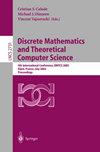Pseudoperiodic Words and a Question of Shevelev
IF 0.5
4区 数学
引用次数: 0
Abstract
We generalize the familiar notion of periodicity in sequences to a new kind of pseudoperiodicity, and we prove some basic results about it. We revisit the results of a 2012 paper of Shevelev and reprove his results in a simpler and more unified manner, and provide a complete answer to one of his previously unresolved questions. We consider finding words with specific pseudoperiod and having the smallest possible critical exponent. Finally, we consider the problem of determining whether a finite word is pseudoperiodic of a given size, and show that it is NP-complete.伪周期词与舍夫列夫问题
将序列中周期的概念推广为一类新的伪周期,并证明了它的一些基本结果。我们重新审视了舍夫列夫2012年的一篇论文的结果,并以一种更简单、更统一的方式对他的结果进行了修正,并为他之前未解决的一个问题提供了一个完整的答案。我们考虑寻找具有特定伪周期并具有最小可能临界指数的词。最后,我们考虑了确定一个有限字是否是给定大小的伪周期的问题,并证明了它是np完全的。
本文章由计算机程序翻译,如有差异,请以英文原文为准。
求助全文
约1分钟内获得全文
求助全文
来源期刊
自引率
14.30%
发文量
39
期刊介绍:
DMTCS is a open access scientic journal that is online since 1998. We are member of the Free Journal Network.
Sections of DMTCS
Analysis of Algorithms
Automata, Logic and Semantics
Combinatorics
Discrete Algorithms
Distributed Computing and Networking
Graph Theory.

 求助内容:
求助内容: 应助结果提醒方式:
应助结果提醒方式:


